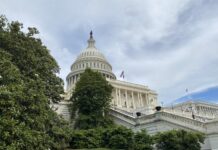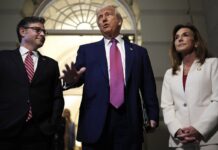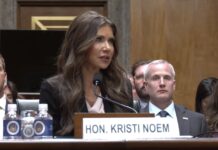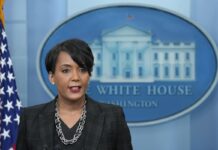WASHINGTON — Asked during Thursday’s final presidential debate about why another round of economic relief hasn’t been approved to aid unemployed Americans and struggling local governments, President Donald Trump and his Democratic opponent, Joe Biden, pointed fingers at opposite ends of the U.S. Capitol.
Trump blamed House Democrats for the stalemate over another coronavirus stimulus bill, blasting the $3 trillion economic relief package passed in May by the House as “a big bailout for badly run Democratic cities and states.”
“It was a way of spending on things that had nothing to do with COVID,” Trump said, criticizing the bill as containing provisions that would encourage undocumented immigrants to enter the country.
Biden said Trump should be lobbying for support for additional economic relief among Senate Republicans, who have balked at the size of that House proposal and another being negotiated between House Speaker Nancy Pelosi (D-Calif.) and Treasury Secretary Steve Mnuchin. On Wednesday, the Senate failed to advance a narrow $500 billion relief measure.
Biden added that all states, regardless of the political leanings of their political leaders, are facing dire financial challenges. Georgia’s GOP House leader pushed for $500 billion in federal aid earlier this year.
“Every single state out there finds themself in trouble,” Biden said. “They’re going to start laying off, whether red or blue, cops, firefighters, first responders, teachers, because they have to balance their budget.”
Facing such a crisis, Biden added, the federal government should use its constitutional authority to increase the deficit and help states, which aren’t able to exceed their budgets in the same way.
The exchange came a little more than halfway through the second and final presidential debate of the election, held at Belmont University in Nashville.
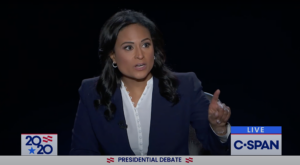
Shortly after the first debate last month — a chaotic 90-minute event in which Trump repeatedly interrupted Biden and the moderator — Trump tested positive for COVID-19. Another debate between the candidates had been scheduled for Oct. 15, but it was canceled after Trump declined to participate when that event shifted to a virtual format.
On the inability to reach a compromise on a new round of coronavirus relief funding, Trump accused Pelosi of not wanting to find agreement, arguing that she believes it would benefit Democrats in next month’s elections.
Pelosi told reporters during a news conference Thursday morning that she sees an “urgent” need to finalize a relief bill, and that she and Mnuchin had made progress this week.
“To protect the lives, the livelihood and the life of our democracy, we continue to be engaged in negotiations, and I am hopeful that we will be able to reach agreement,” Pelosi said. She’s also suggested, though, that a deal may not be possible until after the election.
The Democratic-controlled House has passed two bills amid GOP opposition: the $3 trillion HEROES Act in May, and a slimmer $2.2 trillion version earlier this month.
The larger bill did receive some opposition from moderate House Democrats who said it was too broad and unlikely to gain enough support to become law. The HEROES Act also did include some protections for undocumented immigrants, including them in the direct stimulus checks sent to taxpayers and shielding essential workers from deportation.
Trump said Thursday evening that he wants to pass a relief bill. But it was the president earlier this month who abruptly ended talks between Mnuchin and Pelosi, before reversing course and saying he wanted a larger economic relief package than what was being negotiated.
This article appears in partnership with Georgia Recorder


